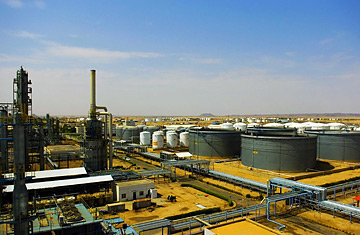
The Khartoum Refinery Co. Ltd. installation in Sudan.
Sudan is infamously mired in civil conflict in its western region of Darfur. But for nearly two years now, the country's 10 southern provinces have begun to emerge from their own 20-year war with the central government in Khartoum that left the territory physically ravaged but in possession of oil, minerals, wildlife and forests. With its capital in the city of Juba, south Sudan, a semi-autonomous region with 6 million residents, now has an annual budget of $1.2 billion and is in possession of most of Sudan's oil reserves. Foreign investors are clamoring to get in. But oil is both promise and danger; Khartoum may not be willing to release its grip on such a resource-rich region. A few weeks ago, Juba's representatives walked out of the national coalition government over the issue of the control of shared oil revenues. While talks are continuing, there are fears of a renewal of war.
In January 2005, an accord ended two decades of fighting between the former rebel Sudan People's Liberation Movement in the south and the government in Khartoum. A coalition government was created and south Sudan was given the option to hold a referendum on independence in 2011. The south Sudanese government was also to receive half of all oil revenues from Sudan's oil (last year, the country exported $6 billion worth of oil). Yet unresolved issues with the peace deal, including oil sharing, deployment of northern troops in southern oilfields and the demarcation of the north-south border, are dangerously straining ties between Juba and Khartoum.
"The issue is lack of transparency in the oil sector," says South Sudan's Information Minister Samson Kwaje. Kwaje says that the government of south Sudan feels it is being "cheated" by Khartoum due to its lack of representation in both the energy and finance ministries. South Sudanese officials say that they are not involved in either the production or marketing of the oil, much less the calculation of how much their share of the petroleum pie should be. (Oil accounts for 95% of Juba's income.) Equally problematic is the ownership of Abyei, an oil-rich region caught between the north and south.
Juba has maintained a sizable military force independent of Khartoum as defense and deterrent. The potential for a breakdown in security, as well as the lack of basic services in the war-ravaged area, has made hundreds of thousands of southern Sudanese refugees wary of returning home from neighboring countries. Aid agencies say that the north-south civil war killed 2 million and uprooted another 4 million. Nevertheless, the dual prospects of long-term economic growth and of southern independence may change that — if the peace holds. Henry Jibi, a refugee in northwestern Uganda, says that he does not have plans to go back anytime soon. But Jibi adds, "I will be back in time to vote for independence."
"South Sudan has come a long way — that's important to recognize," says Shamima Khan of the World Bank's Juba office. In the absence of war, analysts say the key to Juba's future prosperity is the prevention of corruption and the mismanagement of oil money. The southern government also has to find non-oil sources of revenue and to repair broken-down infrastructure. South Sudan literally has to build a nation from dust and rubble. It has yet to implement a system of income taxes and trade duties to regulate the economy. Still, Juba's potential is radiating beyond its borders, and a bustling cross-country trade is under way, as newly certified businessmen from Kenya and Uganda flood in, eyeing the oil riches and selling everything from eggs to cellphones. If the entrepreneurs are hearing war drums, they are not letting alarm get in the way of a lucrative deal.
